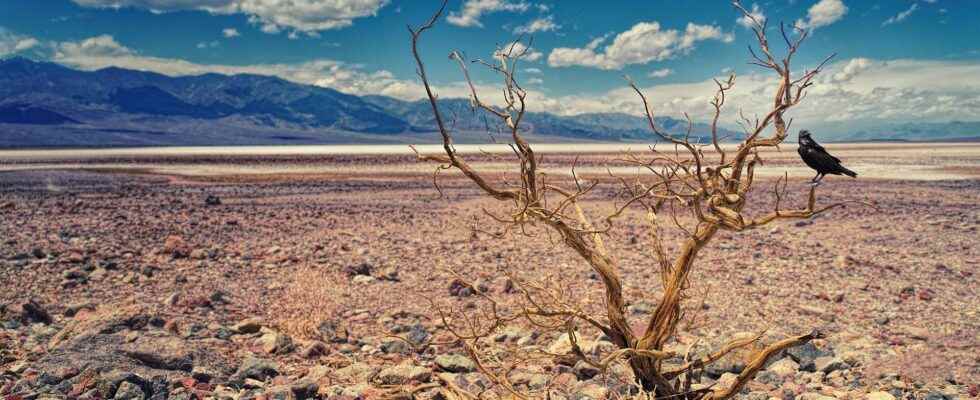You will also be interested
[EN VIDÉO] Saving California from drought with solar energy Every year during the summer, California is plagued by drought. These water shortages handicap crops but give rise to innovative projects like WaterFX, intended to pump the precious liquid from the depths using solar energy. National Geographic Channel tells us more about this company in an excerpt from the Inventing the Future series. The next episode will air tonight, Friday, February 26, 2016, at 9:30 p.m.
50.5°C was reached on June 11 in the death valley in California, a threshold that had never been reached so early since records began 100 years ago. The first months of the year – January, February and March – were the driest on record since measurements began. Only 152mm of precipitation fell in the wettest months of the year over the Sierra Nevada. At the beginning of June, the extremely low humidity level of the soils was already four months ahead, it corresponded to that which the summer should have at the end of the summer, the beginning of thefall. In parts of California, the soils are 40% drier than at the same time in 2016, marked by a drought historical. The problem is that when rainfall is at its lowest, the demand for water for theagriculture (in particular the production ofalmond) and for the inhabitants increases. The four driest years are those consecutive from 2012 to 2015, followed by 2021.
The California desert is undergoing an extreme and rapid process of aridification, linked to the climate change and aggravated by the La Niña phenomenon which has persisted for two years. The trend is more marked in the southwest (California, Arizona, Nevada, Utah), but is present throughout the west of the country, up to the Rocky Mountains. More so, similar signs are also beginning to appear towards the east, with more heat wavesof dry spells and more extreme weather phenomena (floods lightning and storms sand).
Up to 6°C warmer in California within 40 years
A study by LAO predicts an overall temperature rise of around 4 to 6°C in California between 2035 and 2064, compared to the reference average: the desert part of the state will be much more impacted than the coastal part. Recall that the summer of 2021 has already been the hottest on record in California, breaking the 2017 record.
Between 1961 and 1990, the Los Angeles and Sacramento area suffered an average of four days of heat extreme per year. By 2050, forecasting models predict for Los Angeles an average of 9 days of extreme heat per year, and up to 12 days per year by the end of the century. For Sacramento, the study predicts 20 days of extreme heat per year by 2050 and 28 days per year by 2100! For Fresno, the projections rise squarely to 29 days per year by 2050 (against 5 currently), to 43 days by 2100, or before.
Water rationing, fires, and energy consequences
All 58 counties in California are in a state of crisis. Droughts are materialized by a decline in snow cover in the American West in winter, a melting faster than coat snowy with rising temperatures, and greater evaporation of moisture in the soil. The melting snow, accelerated by rising temperatures, also multiplies the risk of flooding, especially on dry and impermeable or concrete soils. An estimated 1.5 million California homes will be at high risk of flooding by 2050. California’s vegetation is also changing, as low-lying, ground-level plants perish in large number, the trees are also weakened and more prone to disease.
On the fire front, at the beginning of June, already 2,000 fires have been counted in California since the beginning of the year. The drought and extreme heat simply scorched the vegetation, facilitating the start of fires and their rapid spread. 2018 recorded the most destructive fires in state history, and 2020 alone brings five of the twenty largest fires ever seen in California. Due to the level of dryness of the soils and vegetation, the Californian authorities are again expecting a season record fires in 2022.
The mega-drought in the American West strongly impacted the level of the two largest water reservoirs, Lake Mead and Lake Powell : in the face of the lack of water which is announced, the organism Southern Nevada Water Authoritywhich manages the water supply of Las vegassaid : ” we are 45 meters away from depriving 25 million Americans of water from the Colorado River”. Eighty percent of Colorado River water is used for agriculture, and states are implementing a farm transformation plan to encourage them to grow less water-intensive crops.
Currently, 6 million Californians are facing water restrictions, with rationing in some localities. The US Governor has asked Californians to reduce their water consumption by 15% compared to 2020, in an attempt to maintain sufficient levels in the reservoirs to allow wildlife (mainly fish) to survive. The goal is far from being achieved: the reduction is just 3.7% at present. This climate increasingly arid also has consequences on theenergy : if the drought persists at the same level this summer – which is envisaged – the hydroelectric network will only operate at 48% of its capacity, according to the US Energy Information Administration.
Only a few days left to take advantage of our special offer for Father’s Day!
Your father is a great science enthusiast and unusual discoveries? And if you offer him a superb scientific exploration in paper format? Benefit from -20% on the Mag Futura (special offer: €15 instead of 19 €): 220 pages, 4 key issues deciphered to understand everything about the science that will mark 2022.
Special offer: -20% reduction on the Mag Futura
Mag Futura is:
- 4 major scientific questions for 2022, from the Earth to the Moon
- 220 pages, 60 experts
- Home delivery
- Electronic gift card
Interested in what you just read?
